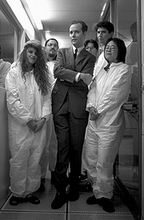
Still relating to this theme of the present moment, I wanted to share a fantastic, lyrical, quotation from Kierkegaard’s Philosophical Fragments in which K explains the very moment of conversion from “untruth” to “truth” from “not to be” to “to be”. He writes:
“And now, the moment. A moment such as this is unique. To be sure, it is short and temporal, as the moment is; it is passing, as the moment is, past, as the moment in the next moment, and yet it is decisive, and yet it is filled with the eternal. A moment such as this must have a special name. Let us call it: the fullness of time.”
I realize that this quote is out of context, needs much explanation (K contrasts the Socratic method of learning to this act of what he calls conversion), but I will not do that right now. For now, I want to just mention Kirkegaard’s focus on the passing, yet still eternal moment of conversion, in which the “divine teacher” creates both the condition (an awakened knowledge of our “untruth”) and the movement to truth. K later emphasizes that this moment can be neither recollected properly or recereated, and that God cannot be “drawn over to our side” again just through our controlled attempts at reconstruction. We experience this movement from untruth to truth in the fullness of the moment. Although Kierkegaard here is referring to the singular defining moment of Christian conversion, I wonder how this also relates to the process of a sort of sanctification, of lifelong miniature movements in the moment towards deeper, greater understandings of specific truths. Learning here can be seen as, in a sense, a mystical experience.
**There is a note in the Kierkegaard text next to the phrase “the fullness of time” that references Galatians 4:4 (and reading this scripture alongside the poetry of this Kierkegaard passage adds to the beauty and the mystery of the point):
“But when the time had fully come, God sent his Son, born of the woman, born under law, to redeem those under law, that we might receive the full rights of sons.”

A lovely pathway near my little schoolhouse.























No comments:
Post a Comment